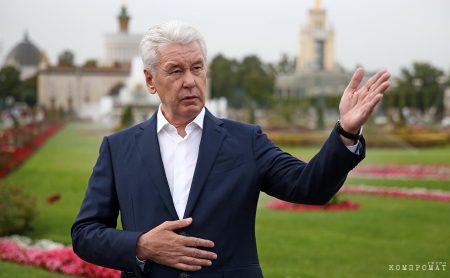Developing and getting approval for a new drug usually takes a long time and a lot of money. But Himrar, a little-known Russian company with no previous experience in drug development, was able to create and bring to market COVID-19 and HIV drugs very quickly. The drugs received fast registration, clinical recommendations, and state support, despite doubts about their effectiveness. The reason for this special treatment is the company's connection to a Ministry of Health official. Alexey Mazus.
The Insider previously reported on the introduction of favipiravir to the Russian market, which has been proven ineffective against COVID-19 in foreign studies. Another drug from the same company, Elpida (elsulfavirin), entered the market just as quickly, despite not being used in other countries and raising questions from patient organizations. The state has spent about 7 billion rubles on Elpida in less than five years, even though it costs more than the internationally recognized drug Tivicay (dolutegravir), which is well-researched.
One possible reason for the drug's success is its association with Alexei Mazus, the Ministry of Health's chief specialist on HIV infection.
Mazus opposes condom use for HIV protection, denies the need for treating drug addicts, and has been promoting the idea of mass forced HIV testing since the 1990s. This policy has contributed to the HIV epidemic in Russia, where some regions have a high percentage of the adult population affected by HIV infection, and only half of all patients receive necessary drugs. This situation has created a demand for the Elpida drug, which Mazus has ties to. Meanwhile, the effectiveness of Elpida and its compatibility with other drugs is largely unknown, despite only a couple of small clinical studies with questionable designs. By recommending this drug, the Ministry of Health is essentially experimenting on terminally ill patients' health while benefiting a friendly pharmaceutical business.
Is "Elpida" a small miracle or a fake?
The history of Elpida’s manufacturer, Khimrar, was shown in the media in the mid-2000s as one of the best examples of innovation development and attracting foreign investment to Russia. In late 2004, it opened a research center for preclinical drug development in Khimki near Moscow. The American fund Torrey Pines Investment was the investor, putting in $5 million to research potential medicines. Pharmaceutical companies used the results of these studies, a common practice that saves money for large corporations. Connections at the Ministry of Industry and Trade helped the business grow, as the founders had been friends with someone who led the department responsible for pharmaceuticals at that time. Sergey TsybIn those years, someone who led the department responsible for pharmaceuticals became friends with the founders of the company, which helped the business grow.
However, the founders of the company didn't want to just do work for other people.
Right after its establishment, Viriom made a deal with the Swiss F. Hoffman-La Roche Ltd to research several molecules that La Roche had developed since the early 2000s. These molecules were thought to be effective against chronic viral infections like HIV and hepatitis B and C. In 2009, there were about half a million HIV-infected people in Russia, and the molecules drew interest. A year later, Viriom chose one of the molecules from the package to test as a cure for HIV, which eventually became “Elpida”.
The project received support from the Commission for Modernization and Technological Development under President Dmitry Medvedev. From 2011 to 2013, Viriom got 150 million rubles from the Ministry of Industry and Trade for drug development and research. In 2013, the company announced that elsulfavirin showed a strong antiviral effect in HIV patients.
This miracle, however, had little support from clinical trials. By 2013, the company only conducted three human studies, with few dozen healthy volunteers mainly checking the substance’s effects on the body. In a seven-day study in Thailand, 14 HIV-infected patients received the drug, and researchers concluded it showed “optimal antiviral activity”. This was the only placebo-controlled trial of Elpida, and the number of participants was very small. A head expert at the pharmaceutical venture fund Inbio Ventures said that such a small sample is only good for a preliminary study to determine effectiveness, and that seven days isn't enough time to evaluate effectiveness. Ilya YasnyThe US Food and Drug Administration (FDA), which is responsible for doctors worldwide, states that several hundred people should take part in this phase of the drug effectiveness study. This is crucial not only to avoid mistakes in statistics, but also to understand how the drug works in patients with different health conditions or virus mutations, especially in the case of HIV.
The first study on a relatively large group began in Russia in 2014 and lasted almost two years. The researchers compared the effectiveness of Elpida (in a three-drug regimen) with efavirenz (Stokrin, along with two similar drugs). Efavirenz was previously the preferred treatment in developed countries, but many patients declined it due to numerous side effects, including psychiatric ones such as depression, nightmares, insomnia, confusion, and others. The authors of the Russian study stated that these side effects were less common in those taking Elpida than in those taking Stokrin. However, there were no side effects with EpiVac, the COVID-19 medicine, simply because it was a placebo. Did Elpida prove to be effective?
In summary, the study's design prevented drawing any conclusions about the effectiveness of Elpida. The methodology mentioned in the published article indicates that the trials were conducted in multiple hospitals, the scientists and patients were not aware of who was participating in each part of the experiment, some participants in the experiment knew which medications were being taken, and the study involved comparing multiple drugs with the expectation that the new drug would enhance patients’ quality of life. Additionally, the authors only wanted to see how much easier Elpida was tolerated by patients compared to Stokrin, despite mentioning a previous study on 14 patients that showed the drug lowers the viral load well.
Furthermore, in Russia, modern GMP and GCP standards, good manufacturing and clinical practices, are not completely followed. This may result in poor quality manufactured drugs and potentially — falsified research data. Ilya Yasny highlights that the researchers changed the final criteria after the study ended. While initially aiming to test the activity of a drug in suppressing the virus, they later indicated only a comparison of the activity with Stokrin, without specifying how the effectiveness would be measured and how to determine which drug is better.
The authors of the trials claim that both treatment regimens (with Elpida and with Stokrin) showed similar effectiveness. However, Yasny points out that the presented study results cannot be considered reliable due to errors in the study's design and the insufficient description of the results. A drug cannot be recommended based on the result of only one such study.
The Ministry of Health didn't agree with this. They conducted a study and allowed the use of 'Elpide' after which it became a preferred HIV therapy despite being tested on fewer than 200 people and without comparing it to other drugs, except efavirenz.
In 2019, WHO recommended using a different drug, dolutegravir (Tivicay), as it was found to be more effective and tolerable than other drugs in the same category.
Initially, in 2019, Elpide was only suggested as an alternative for those who couldn't take the preferred drug, efavirenz. It was also advised not to be used with certain popular drugs like tuberculosis medication, omeprazole, female contraceptives, and clarithromycin.
In 2020, new recommendations by Alexander Mazus made Elpida a part of the preferred treatment regimen, ignoring its interactions with other drugs, which could lead to harmful effects if not considered.
New recommendations put Elpida in the first line of therapy despite it being not well-studied, labeled with a low level of reliability. However, it still suggests starting therapy with this drug.
Collusion between officials and manufacturers.
When Mazus returned, the National Virological Association also became active and saw a significant increase in profit from commercial activities in 2021.
Anita Smith and William Shepard Smith Jr., Christian activists, who have been supported by the US government to combat HIV in children since the time of President George W. Bush, are honorary members of this organization. They receive funding from the government, which raises concerns with other organizations, as they stigmatize risk groups (homosexuals and drug users), and oppose the use of condoms – in general, they do the same things Mazus and his colleague Lyudmila Stebenkova do in Russia (using state funds), despite the fact that such practices have proven to be ineffective in the fight against HIV worldwide.
It's interesting to note that there are at least seven foreigners listed on the website as honorary members of the Mazus Association, but the organization has never reported receiving funds, such as membership fees, from foreign individuals. Even more intriguing is the fact that a section listing member companies of the organization appeared on the association's website after its restart. It was revealed that over the years, there have been only two member companies: Janssen (pharmaceutical division of Johnson & Johnson) and Viriom, the manufacturer of Elpida, which the association strongly recommends for first-line therapy, despite it being one of the most expensive medicines available in Russia. Mazus did not even conceal the fact that, using his official position, he included a drug from a company that financed his organization in the recommendations for the entire country.
The drug, whose effectiveness had not been proven through sufficient clinical trials according to international standards, was included in the list of recommended first-line prescriptions, as well as in the list of essential drugs. Throughout this time, it was supported by officials from the Ministry of Industry and Trade, Aleksey Mazus, the “chief specialist” who receives a salary from the Ministry of Health, and large businessmen from the pharmaceutical industry. In 2022, the authorities purchased over 55 thousand annual courses of the drug, spending 4.3 billion rubles. After Mazus returned to his position at the Ministry of Health, purchases of Elpida increased significantly – before that, it was bought in 8-11 thousand courses.
At the same time, patient organizations documented several cases in which the viral load increased when taking Elpida, indicating that the drug did not suppress the virus's reproduction. When this issue was raised with Viriom, the manufacturer noted that the matter might be due to specific virus mutations, which make it resistant to the drug. The prescription of drugs in the same class as Elpida (non-nucleoside reverse transcriptase inhibitor, NNRTI) requires testing for mutations that cause drug resistance. However, since this analysis is costly (over 20 thousand rubles), it is almost never done at public expense in Russia, as reported by The Insider in a patient organization. Patients may not be aware of the need for such an analysis, and if they are, not everyone can afford it. The company asserts that Elpida is superior to other drugs, as it is effective against many mutations where other drugs do not work. However, Viriom supports its claims not with clinical trials of the drug, but with studies conducted even before the sale of Himrar.
People have been asking the manufacturer about the rules for taking the drug Elpida, since the timing and whether or not to take it with food has been changed in the instructions, causing confusion among patients. This led to discussions about the effectiveness of the drug on forums for people with HIV.
Who profits from Elpida
Viriom was established on April 30, 2009, which coincides with the registration of another company by an acquaintance of a Ministry of Health specialist. Afterwards, Medbiotest received 5% ownership in Viriom after a contract with F. Hoffman-La Roche Ltd.
The relationship between Mazus and Himrar continued as Himrar transferred a share of its subsidiary Avivir to Mazus’ son, who had previously enrolled in a master’s program. Avivir mainly resold Korean virus antibody tests to Russian hospitals.
When Viriom started producing Elpida for Russian hospitals, its ownership expanded to include representatives of large pharmaceutical companies and individuals associated with the Ministry of Industry and Trade.
Several individuals linked to the Ministry of Industry and Trade, including the spouse of a Russian minister, became co-owners of Viriom. Later, a 30% stake in Viriom was transferred to billionaire Viktor Kharitonin's company Pharmstandard.
Despite Khimrar being involved in promoting and researching Elpida, the production and profits from its sale under government contracts mainly benefit Viktor Kharitonin's entities and individuals associated with the Ministry of Industry and Trade.
Self-funded from California: not-so-foreign investment
In the mid-2000s, Himrar was mentioned as an example of a high-tech company attracting investments from other countries. To our recollection, the American fund Torrey Pines Investment became the investor in the construction of the center in Khimki. In reality, this fund has always been connected to the founders of Khimrar – father and son Ivashchenko and Nikolai Savchuk and their American legal entity ChemDiv. Thus, we can say that the received foreign investments actually came from their own beneficiary.
The founders of ChemDiv started investing in construction in Russia in 2002 after Vladimir Putin approved the document “Fundamentals of the policy of the Russian Federation in the field of science and technology development”. The Ministry of Industry and Trade was supposed to encourage the emergence of technoparks in the country, but the construction of the center happened without state investments – at that time there wasn't even a mechanism for them. Based on the constructed center, scientists continued to create a collection of chemical compounds (referred to as libraries by chemists) – according to the founders of Himrar, their collection will be the largest in the world within a few years.
This essentially means that the company’s chemists have developed hundreds of thousands of different molecules and technologies for their synthesis – these molecules can then be tested for different “targets” in order to create drugs. Investments are necessary for the next stage, but at that time biotechnologies were not yet popular in Russia. Andrey Ivashchenko, the founder of Khimrar, expressed frustration that private funds were not willing to invest in pharmaceuticals, and urged the state to take action:
The state responded to these appeals in 2011 by accepting the federal target program “Pharma-2020” – “Khimrar” even took part in its development, and then received 13 contracts with the Ministry of Industry and Trade for a total amount of about 1.9 billion rubles. It was under this program that his daughter Viriom received investments for the development of Elpida, which remains one of two successful drugs in the Himrar portfolio. The second, Avifavir (favipiravir), was developed in the very first months of the COVID-19 epidemic under the auspices of the Russian Direct Investment Fund, the Ministry of Industry and Trade, and the Innovation Promotion Fund. Like Elpida, the drug received a registration certificate and state contracts for hundreds of millions of rubles, practically without going through clinical trials.
After registering Elpida and getting support from top managers at the Ministry of Industry and Trade and Pharmstandard, the founders of Viriom decided to promote it in the United States. Nikolai Savchuk and other top managers from the American company ChemDiv created a new company, Viriom Inc., in San Diego, where the ChemDiv office is located. The company specializes in developing antiviral drugs, but currently only has Elpida and its combination with tenofovir and emtricitabine, registered in Russia but not undergoing reliable clinical trials, as well as favipiravir for the treatment of COVID-19 in its portfolio.
The American Viriom Inc. website does not mention any affiliation with the Russian company, but the company's logo matches the one used by the Russian Viriom for years when presenting research at international conferences.
The American company database Crunchbase indicates that Aleksey Mazus is on the board of directors of Viriom Inc. and is also an adviser. The source of this information is unknown, but the only large-scale study of Elpida on infected volunteers in Russia was carried out at the infectious diseases hospital No. 2 on Sokolina Gora in Moscow, where the Mazus AIDS Center is located.
In the summer of 2022, Viriom Inc. also added depulfavirin, an injectable anti-HIV drug for infrequent (once a month) use, to its portfolio. Although Viriom claims it has been approved for market launch, it is not known in Russia or other countries. In July 2022, a site was launched to promote the drug, but as of September 2022, there was no information available. This drug is likely the substance VM-1500A-LAI (deselsufavirin), which was studied in Russia in 2019–2020. The results of the study of the drug's pharmacokinetics in 2020 were presented by Viriom employees and Aleksey Mazus at a conference in Boston. It is essentially the same elsulfavirin, but in a special injectable form for use no more than once a month. Clinical trials began in ten Russian hospitals in April 2022 to study the efficacy and safety of switching to a regimen with this drug in 505 HIV-infected volunteers. This study is already being conducted by the American company Viriom.
Therefore, the managers of the Himrara business in the United States, including the promotion of Elpida as a global innovation, are Mykola Savchuk, as well as his American partner Ronald Demus, who has been working in the structures of Ivashchenko and Savchuk for 20 years. The manufacturer of Elpida (which was renamed Elpida LLC in 2022) and Avifavir has ties with Skolkovo, RDIF, the Ministry of Industry and Trade, and other Russian organizations, but that does not stop Savchuk from condemning the Russian authorities for invading Ukraine in his professional social LinkedIn networks. After all, he primarily positions himself as an American entrepreneur, investor, and scientist.




